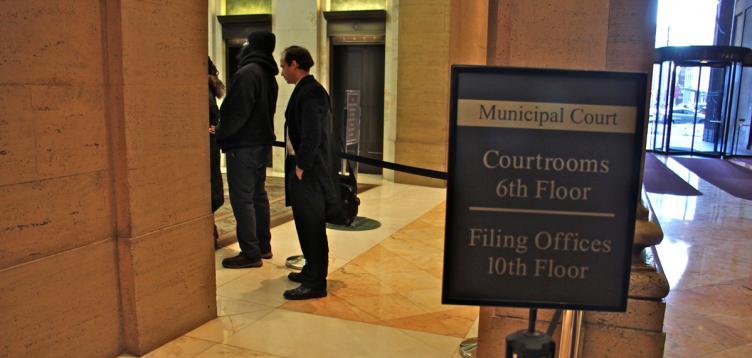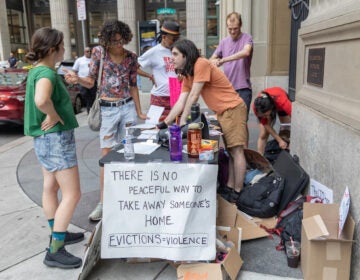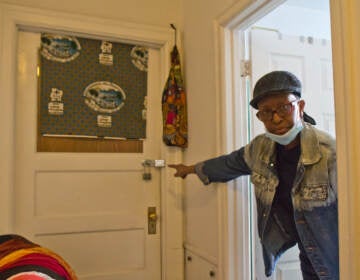Study: Spending now on legal aid would save city down the road
Currently, the vast majority of renters do not receive legal aid in Philadelphia, where landlords evict more people than in other large cities.

Outside Philadelphia Municipal Court's landlord-tenant unit in the Widener Building. (PlanPhilly)
An annual investment of $3.5 million would cover the cost of legal representation for the thousands of low-income tenants who find themselves facing eviction orders in Philadelphia’s Municipal Court, according to a study released Tuesday by the Philadelphia Bar Association.
The $3.5 million investment would ultimately save the city $45.2 million in public costs associated with increased homelessnesses and displacement, the legal professional organization argued.
Currently, the vast majority of renters do not receive legal aid in Philadelphia, where landlords evict more people than in other large cities.
A lawyer is only guaranteed in criminal court. As a result, the study found that between 2007 and 2016, 80 percent of landlords are represented, while only 7 percent of renters are. Without an attorney, renters faced “disruptive displacement” 78 percent of the time, the report said.
But when they have a lawyer, the tenant has a 95 percent chance of avoiding homelessness or other potentially life-shattering outcomes, according to the Bar Association.
“There is a huge disparity of power and knowledge so low-income renters end up doing very poorly,” said Ethan Fogel, a partner with Dechert LLP, a law firm that represents tenants on a pro-bono basis. “People are intimidated. There are all sorts of complicated rules and the tenant often doesn’t know about them, so they can’t mount a credible defense.”
Nateria Morrison is one renter who can testify to the benefits of having legal support in landlord-tenant court. She ended up getting sued by her landlord after she threatened to withhold rent money when he delayed fixing an electrical outage that hit her kitchen and bedroom in February. While withholding rent for property that is not up to code is legal in Philadelphia, that didn’t stop her landlord from trying to evict her.
After facing off with her landlord for three months, she managed to get assistance from one of the handful of legal aid lawyers who represent low-income renters in landlord-tenant court.
“I’m uncomfortable in courtrooms…[but] they were like my eyes and ears in the legal system,” remembers Morrison. “They knew [what was happening] before I knew. They said I’d get paperwork on a particular day, or I had to be somewhere at this place and time. I was definitely grateful for the hands-on attention.”
The legal support didn’t prevent Morrison from losing that apartment, but it did keep her from experiencing homelessness or receiving a black mark on her rental record. She got 90 days to find a new apartment and the landlord was ordered to return her security deposit.
The 66-page study is a project of the Bar Association’s Civil Gideon and Access to Justice Task Force, which hired the international financial advising firm Stout Risius Ross to conduct the research. The return on investment they calculated took into account public costs associated with providing shelters for people made homeless following an eviction, hospital visits, and mental health care.
Ethan Fogel, a partner with Dechert LLP, a law firm that represents tenants on a pro bono basis, said he is confident the mayor and the City Council are invested in finding solutions to the city’s eviction crisis, and that this research is meant to help convince them that these services could be provided in an efficient and cost-effective fashion.
City councilmembers led by at-large member Helen Gym have secured over $1 million over the last two years to beef up tenant aid in eviction court, while Mayor Jim Kenney organized a task force to study the problem.
But the Bar Association’s recommendation is no sure thing in City Hall. Investing up front to prevent potential public costs down the road isn’t an easy sell for a cash-strapped city like Philadelphia.
Landlords are another tough audience for the lawyers’ research. Harvey Spear, president of the Homeowners Association of Philadelphia (HAPCO), said that many people assume most landlords are wealthy and own large numbers of properties.
He said that much of HAPCO’s membership only own a couple of properties and could be just as deserving of legal assistance. Morrison’s landlord, for example, did not have a lawyer.
Spear said that putting more lawyers in landlord-tenant court could exacerbate housing problems in the city by creating more burdens for property owners and increasing the likliehood that they leave the rental business altogether.
The city will “just start losing properties,” said Spear. “I don’t think it’s fair if someone stops paying the rent and ends up in eviction court that they get free legal aid and can delay this longer and longer while landlords have expenses and mortgages and upkeep on the properties to pay.”
If Philadelphia were to provide legal aide for all low-income tenants at risk of eviction, it would not be the first city to do so. By 2022, New York plans to allocate $155 million annually for a similar effort to ease tenant pain. In 2017, New York’s landlord-tenant court 232,000 cases filed against tenants. In that same year, Philadelphia saw just over 22,000 such cases.
Fogel said the disparity in costs between the programs can partly be explained by how much more expensive everything from legal to housing costs are in New York. Then there’s also the question of scale: New York is almost six times Philadelphia’s size, with renters representing a far higher percentage of households.
Morrison, for one, thinks the investment would be worth it for Philadelphia,
“I would like to see them stay on top of these people who are slumlords and don’t care about the people they are housing,” she said. “We need someone to keep a watch out to make sure everyone’s paperwork is straight because there’s a lot of people out here trying to take advantage.”
WHYY is your source for fact-based, in-depth journalism and information. As a nonprofit organization, we rely on financial support from readers like you. Please give today.







